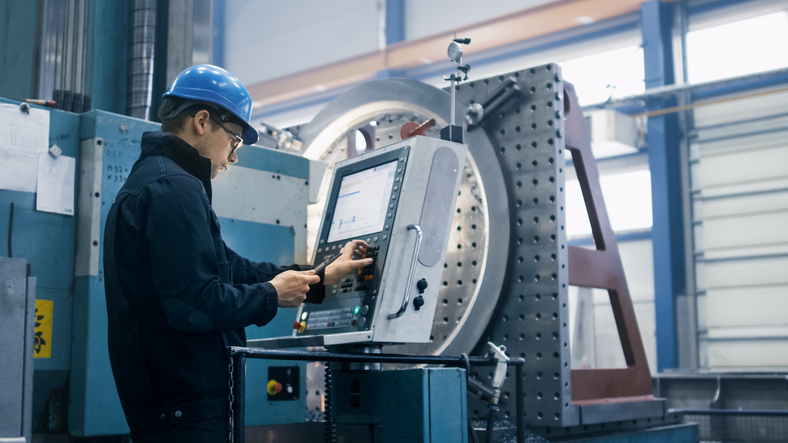Table of Contents
- How to Be a CNC Machine Operator?
- Frequently Asked Questions
- What is a CNC Machine Operator?
- What are the educational requirements for becoming a CNC Machine Operator?
- What are the job responsibilities of a CNC Machine Operator?
- What are the salary and job outlook for CNC Machine Operators?
- What skills and qualities are important for a successful CNC Machine Operator?
Are you interested in entering the world of manufacturing? Do you enjoy working with machinery and seeing the results of your efforts come to life? If so, becoming a CNC machine operator may be the perfect career path for you. In this guide, we will explore the skills and knowledge necessary to succeed in this field and provide tips on how to get started on your journey to becoming a CNC machine operator.
CNC (Computer Numerical Control) machines have become increasingly popular in the manufacturing industry due to their precision and efficiency. As a CNC machine operator, you will be responsible for setting up, operating, and maintaining these machines to produce high-quality parts and products. This is a challenging and rewarding career that requires a unique set of skills and experience. Keep reading to learn more about how you can become a skilled CNC machine operator and join the exciting world of manufacturing.
- Gain knowledge in mathematics, blueprint reading, and computer programming.
- Complete a CNC training program or apprenticeship.
- Get hands-on experience operating CNC machines.
- Obtain certifications, such as those offered by the National Institute for Metalworking Skills.
- Continuously update knowledge and skills to keep up with advancements in technology.
How to Be a CNC Machine Operator?
Becoming a CNC machine operator requires a combination of technical skills and a willingness to learn. If you are interested in this career path, there are several steps you can take to prepare for this role. In this article, we will discuss how to become a CNC machine operator, including the skills needed for the job, the education and training required, and the job prospects in this field.
Step 1: Acquire the necessary skills
To become a CNC machine operator, you need to possess a variety of technical skills. These include knowledge of computer programming, math, and physics. You should also be able to read and interpret blueprints and schematics. Additionally, you will need to have good hand-eye coordination and the ability to work with precision and attention to detail.
To develop these skills, you can take courses in computer programming, math, physics, and mechanical engineering. You should also consider working as an apprentice or intern at a machine shop or manufacturing company to gain hands-on experience with CNC machines.
Step 2: Obtain the required education and training
Most CNC machine operator positions require a high school diploma or equivalent. However, many employers prefer candidates with an associate’s degree or vocational training in a related field, such as mechanical engineering or computer programming.
You can obtain this education and training through community colleges, vocational schools, or technical institutes. These programs typically take one to two years to complete and include courses in computer programming, math, physics, and machine tool technology.
Step 3: Gain experience with CNC machines
To become a proficient CNC machine operator, you need to gain hands-on experience with these machines. You can do this through apprenticeships or internships, or by working in a machine shop or manufacturing company.
During this time, you will learn how to set up and operate CNC machines, troubleshoot problems, and perform routine maintenance. You will also learn how to read blueprints and schematics, and how to use computer software to program CNC machines.
Step 4: Obtain certification
While not always required, certification can help you stand out in the job market and demonstrate your proficiency as a CNC machine operator. The National Institute for Metalworking Skills (NIMS) offers several certifications for CNC machine operators, including CNC Milling: Programming, Setup, and Operations and CNC Turning: Programming, Setup, and Operations.
To obtain these certifications, you will need to pass a written and practical exam that tests your knowledge and skills in CNC machine operation.
Step 5: Explore job opportunities
Once you have acquired the necessary skills, education, and experience, you can begin exploring job opportunities as a CNC machine operator. These positions are available in a variety of industries, including manufacturing, aerospace, automotive, and medical device production.
You can search for job openings on online job boards, such as Indeed or Monster, or by contacting machine shops and manufacturing companies directly.
Benefits of being a CNC machine operator
Becoming a CNC machine operator can be a rewarding career choice, with several benefits. These include:
- Job security: With the increasing demand for CNC machined products, there is a growing need for skilled operators.
- Competitive pay: CNC machine operators typically earn a competitive salary, with the median annual wage in the US being $44,900 according to the Bureau of Labor Statistics.
- Opportunities for advancement: With experience and additional training, CNC machine operators can advance to supervisory or managerial positions.
- Job satisfaction: CNC machine operators take pride in producing high-quality, precision parts that are used in a variety of industries.
CNC machine operator vs. manual machinist
While both CNC machine operators and manual machinists work with machine tools to produce precision parts, there are several key differences between these roles.
- Technology: CNC machines use computer software to control the cutting tools, while manual machinists use hand-operated tools.
- Speed and efficiency: CNC machines can produce parts much faster and with greater precision than manual machines.
- Training and education: CNC machine operators typically have more education and training in computer programming and mechanical engineering than manual machinists.
- Job prospects: While the demand for manual machinists is declining, the demand for CNC machine operators is growing.
Closing thoughts
Becoming a CNC machine operator requires a combination of technical skills and hands-on experience. By acquiring the necessary education and training, gaining experience with CNC machines, and obtaining certification, you can set yourself up for a successful career in this field. With job security, competitive pay, and opportunities for advancement, becoming a CNC machine operator can be a rewarding career choice.
Frequently Asked Questions
Do you want to learn how to become a CNC Machine Operator? Here are the most frequently asked questions about this profession.
What is a CNC Machine Operator?
A CNC (Computer Numerical Control) machine operator is a professional who operates computer-controlled machines, which are used to create precision parts from materials such as metal, plastic, or wood. The operator is responsible for setting up, operating, and monitoring these machines, as well as performing routine maintenance and troubleshooting when necessary.
Being a CNC machine operator requires technical skills, attention to detail, and the ability to read and interpret blueprints and technical drawings. It is a challenging and rewarding profession that offers many opportunities for career advancement.
What are the educational requirements for becoming a CNC Machine Operator?
There are no specific educational requirements for becoming a CNC machine operator, but most employers prefer candidates who have a high school diploma or equivalent. Some employers may also require a certificate or diploma in CNC machining or a related field.
To become a skilled CNC machine operator, it is essential to have hands-on training and experience with CNC machines. This can be gained through on-the-job training or by attending a vocational school or community college program that offers CNC machining courses.
What are the job responsibilities of a CNC Machine Operator?
The job responsibilities of a CNC machine operator include setting up and operating computer-controlled machines, monitoring the machines during operation, performing routine maintenance and cleaning, and troubleshooting any issues that may arise. CNC machine operators must also be able to read and interpret technical drawings and blueprints, perform quality control checks, and make adjustments to the machine settings as needed.
In addition to these technical tasks, CNC machine operators must also be able to work independently, communicate effectively with supervisors and coworkers, and maintain a safe and clean work environment.
What are the salary and job outlook for CNC Machine Operators?
The salary of a CNC machine operator varies depending on factors such as experience, location, and industry. According to the Bureau of Labor Statistics, the median annual wage for CNC machine operators was $44,190 in May 2020.
The job outlook for CNC machine operators is positive, with a projected job growth rate of 3% from 2019 to 2029. As technology continues to advance, the demand for skilled CNC machine operators is expected to increase, particularly in industries such as aerospace, automotive, and manufacturing.
What skills and qualities are important for a successful CNC Machine Operator?
To be a successful CNC machine operator, it is essential to have technical skills such as the ability to read and interpret technical drawings, knowledge of machine programming and troubleshooting, and experience with tooling and machine maintenance.
Other important skills and qualities include attention to detail, good communication skills, the ability to work independently and as part of a team, physical dexterity, and strong problem-solving skills. Additionally, CNC machine operators must be able to work safely and efficiently in a fast-paced production environment.
In conclusion, becoming a CNC machine operator requires dedication, attention to detail, and a willingness to learn. With the right training and experience, anyone can master the skills needed to operate these sophisticated machines.
Firstly, it’s important to understand the basics of how CNC machines work and their various components. This knowledge will help you troubleshoot any issues that may arise during operation and improve your overall efficiency.
Secondly, gaining hands-on experience through on-the-job training or apprenticeships can be invaluable. This will give you the opportunity to refine your skills and learn from experienced operators in the field.
Lastly, staying up-to-date with the latest technology and industry developments is crucial to your success as a CNC machine operator. Continual education and training will help you stay ahead of the curve and remain competitive in the job market.
In summary, being a successful CNC machine operator requires a combination of technical knowledge, practical experience, and ongoing learning. With these tools at your disposal, you can excel in this exciting and dynamic field.
Request a quote today!
[contact-form-7 id="1578" title="Contact form"]
Please compress the file into a ZIP or RAR file before uploading. Alternatively, send through your RFQ by email.
enquires@unitymanufacture.com





